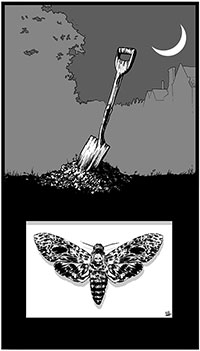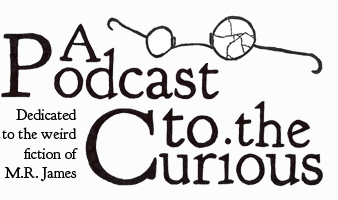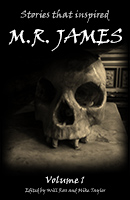 This episode Mike & Will put on their thinking caps and puzzle their way through ‘Two Doctors‘ by M.R. James.
This episode Mike & Will put on their thinking caps and puzzle their way through ‘Two Doctors‘ by M.R. James.
Thanks to Kirsty for the excellent readings, and to Alisdair Wood for the great illustration to the left.
Don’t forget to vote on which story you would like to see Stephen Gray and his crew film next, ‘The Malice of Inanimate Objects’ by M.R. James or ‘The Willows’ by Algernon Blackwood.
Show notes
- Story Notes by Rosemary Pardoe (Ghosts & Scholars)
Visit the ever-excellent Ghosts & Scholars for a useful set of notes which shed light on some of the more perplexing aspects of this story. - Gray’s Inn (Wikipedia)
James says he found the papers which make up this story in a dossier addressed to a lawyer in Grey’s Inn. Also see Gray’s Inn on Monty’s World. - Coronet and Bird Crest (MyFamilySilver.com)
The ‘bedsheets’ purchased by Dr Quinn features a bird and coronet, a motif common to a quite a few family crests from this period. - St. Anthony meeting the Satyr (Gallery.ca)
The rector makes reference to ‘Anthony conversing with a satyr’ as featured in the book of Jerome. This is a 1640 engraving of this scene. - An Elicidation (?) of the Plot of ‘Two Doctors’ by Lance Arney (Amazon.co.uk)
This essay features in the collection of essays ‘Warnings to the Curious’ and was a great help to us in researching this story.
Podcast: Play in new window | Download
Subscribe: RSS
Tags: Gray's Inn, Islington, M.R. James, Montag, Robert LLoyd Parry, Two Doctors








The fragmented story can be a useful device, but on this case I don’t think it works, there are too many gaps between the various parts, and the story falls apart.
That said, the description of the thing that is dug up in the dream is one of the creepiest images James ever came up with.
Well, you did your best, but I fear even you guys can’t make this story really interesting. It’s possibly my modern sensibility, but I want a horror story to build on a single mythos and stick with it, rather than to throw in all sorts of random ickyness in the hope that some of it will stick.
Puzzles can be great stories – I think the detective story model is one that James usefully borrowed with some of his other work – but there does need to be both the ability for the reader to work out what’s going on, and a resolution so that the reader can check his conclusions.
Glad to see you’s are back! I missed these podcasts.
I tried reading this once and just plain didn’t like it.
I think I understand what James was trying for, to reveal a bundle of evidence surrounding an event, that’s great, but this story is almost impenetrable. It’s hard to follow and there’s no real reveal.
Also, I really think The Willows should be made. James is great, but The Willows…oh, The Willows NEEDS a film treatment.
Sorry it has been a while. We did the show quite a few weeks ago – and then realised that it hadn’t actually recorded.
Of all the stories to have to do twice…
Ah no worries! That does suck immensely, I mean, Two Doctors…good God.
I thought one of you’s had died or something. That’d be pretty awkward.
And what’s this about a soundtrack of the show I heard somewhere?
Quarter*master* and the Pit?
I had a lot more fun listening to this podcast than I did reading the story.
Also, I couldn’t stop giggling whenever the guys mentioned the name “Dr. Quinn.” I guess Dr. Quinn, Medicine Woman was strictly a U.S. show:
http://en.wikipedia.org/wiki/Dr_Quinn
So yeah, I kept picturing Dr. Quinn as Jane Seymour. I think it improves the story.
In tomb robbing, everything that wasn’t the body was left, since it was property, the body belonging ‘unto God’ so often valuables were left on the burst grave (the grave was never fully opened, a hole wide enough to allow someone to break the coffin lid and haul the contents out being the most effective method for common graves, but not applicable here)
The oddity of someone being buried with favoured bed linen sound like the sort of thing that could crop up in the purview of an antiquary… It rings some bells with me, but I read some odd things in my youth.
And maybe the affable Dr Quinn’s “Dealer” was more than a seller of second hand linen. WE don’t know of Quinn’s other interests, and many doctors of the period had a morbid taste for samples.
Great discussion, and you make a good stab at unravelling various plot strands and ideas. It’s a frustrating story, rather like watching an experimental film by a skilled but somewhat self-indulgent director.
Re: Dr Abell’s friends in the lanes, Dante in his Inferno refers to ‘neutral angels’ that weren’t for God or Lucifer, but only for themselves. Not sure where he got that, but MRJ would have known his Dante, and indeed the mediaeval legends the poet presumably drew upon.
Keep up the good work!
I’ve never thought ‘Two Doctors’ was the worst or weakest MRJ story, but I _am_ sorry that you had to record the episode twice, in this case!
I was wondering — are you planning on covering ‘The Five Jars’? I get the impression it’s often overlooked or excluded, but I think it’s enjoyable and no less spectral & peculiar for being written for someone too young to drink port with (or too female to be caned by?).
I’ve often wondered whether James read Dante – can’t recall a reference. But in the Commedia there’s a phrase about a dream which passes like thunder in the head. I can’t remember where exactly this occurs; but it reminds me of a similar phrase in “The Rose Garden”, for what it’s worth. Does anyone recognise the origin of the clergyman’s reference to the axe moving itself against him who lifts it? It sounds biblical to me, and might be a further clue.
I agree about Abel and the coven – his question “Who brought you?” suggests as much.
Isaiah 10:15
Shall the axe boast itself against him that heweth therewith? or shall the saw magnify itself against him that shaketh it? as if the rod should shake itself against them that lift it up, or as if the staff should lift up itself, as if it were no wood.
‘Now it was a practice of mine before the war occasionally to buy old ledgers of which the paper was good, and which possessed a good many blank leaves, and to extract these and use them for my own notes and writings.’
This reminds me of the 1993 ‘Ripper Diaries’ hoax. A journal said to have been written by James Maybrick, admitting to the Ripper murders, was apparently found under some Liverpool floorboards.
The pages and binding were authentically Victorian but the text, alas, was not.
Some commentator at the time remarked that if they examined the book, it would surely be missing its first few pages, as they’d have already been written on.
Of course this turned out to be true. The diary was discredited.
However, this interesting hoax couldn’t have been attempted without a suitable blank book, just the sort for which James’ protagonist also keeps an eye open.
Well, it made me smile.
In regard to buying up old ledgers for the paper, I figured they’d be rationing paper like they did in the US so he was not able to go out and buy new paper cheaply. I could be dead wrong but I didn’t even question that when I read it.
I’ll have to look up your Ripper Diaries hoax, Carla. It sounds like interesting reading even if it was discredited.
I’m very puzzled by the final sentences. If you wanted to steal bed-linen from a coffin, you’d presumably have to do it fairly soon after burial – it would be pretty foul after a long time, even in a nice clean mausoleum. I’m also puzzled as to why a description of the theft of a comfy pillow and some sheets would be “blunt and terrible”. But the greatest puzzle of all, I think, is this: why on earth did MRJ add an “ending” which is so unhelpful ?
I was doing a little farting around, investigating the family names mentioned in the Coronet and Bird link above. Turns out there was an American Barker family that was wholesale accused of witchcraft in Massachusetts. The father, William Barker, Sr., “confessed to having been in the snare of the devil for three years. He went on to describe the devil looking like a black man with a cloven foot. He stated that the Devil promised to pay all of his debts if he would give him his body and soul.” William escaped from the authorities, then died in 1718 (!). Since he spent his whole life in American, he could not have been the victim of the grave-robber, but I wonder if James used him as inspiration. Or maybe it’s just an interesting coincidence.
Did anyone else make the connection also the Ash Tree that Matthew Fell also”always wishes to have thing pleasant about him” ?
I think that the answer to the puzzle of the fragmentary ending occurs early in the story. “The man who would been the defendant or prisoner seems never to have appeared”. Perhaps Dr Abell has suffered the heavy penelty the Rector hinted at and been carried away by the mysterious creatures he had been consorting with.